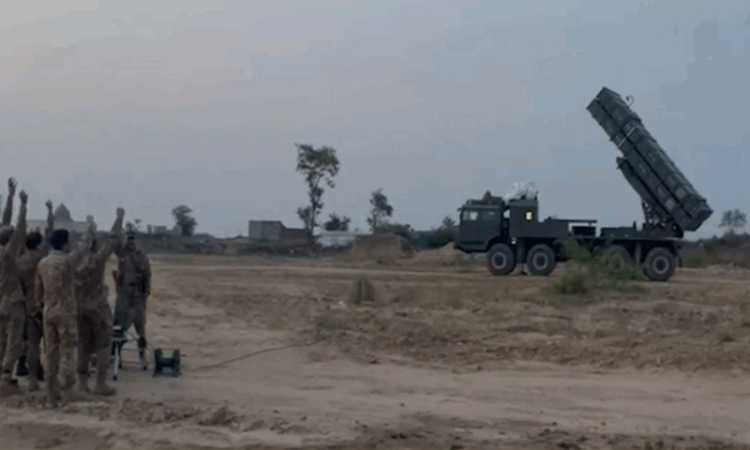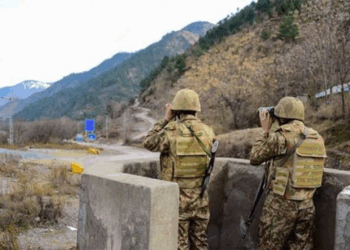Islamabad/Karachi, May 10, 2025: In a decisive response to ongoing Indian aggression, Pakistan has launched a major retaliatory military campaign early Saturday morning, officially named Operation Bunyan-un-Marsoos, according to credible security sources.
As part of the operation, all Indian bases identified as launch sites for attacks on Pakistani civilians and religious sites, particularly mosques, are being targeted. Multiple strategic locations are being engaged simultaneously, security officials confirmed, as the operation continues to unfold.
Pakistan has deployed its Al-Fatah missile system in this retaliatory campaign, dedicating the strikes to the memory of Pakistani children martyred in recent cross-border assaults by Indian forces. Security sources emphasized that the nation will never forget the sacrifice of these innocent lives.
The Fatah-1 missile system has been used to strike multiple Indian targets, with newly released footage confirming at least one successful hit. In parallel, Pakistani drones have been conducting surveillance flights over New Delhi and the Indian state of Gujarat for the past three hours as part of the ongoing operations.
A significant blow was dealt when a military intelligence training facility in Rajouri—allegedly used to coordinate terrorist activities inside Pakistan—was obliterated, according to security insiders.
Furthermore, Pakistan has reportedly destroyed India’s Akhnoor Aviation Base, Bathinda Airfield, and Sirsa Airfield, the latter being acknowledged by Indian media itself as heavily damaged. An artillery position in Dehrangyari was also neutralized.
One of the most critical strikes included the successful targeting of a BrahMos missile storage facility in Nagrota, with reports indicating substantial losses for India. A similar BrahMos storage site in Beas, believed to have been used to launch missiles at Pakistani territory, was previously destroyed.
Additional significant losses for India include the Udhampur Airbase and the Pathankot Airfield, both rendered inoperative. Pakistan also took out India’s brigade headquarters at G-Top and a key supply depot in Uri, severely disrupting Indian military logistics.
Of particular note, the Adampur Airfield, identified as the launch site for missile attacks on Sikh-majority areas in Amritsar and targets in both Pakistan and Afghanistan, was destroyed during the latest retaliatory strikes.
Security officials confirmed that multiple high-value targets continue to be engaged, with extensive damage inflicted on enemy assets. Pakistan’s military and political leadership have warned that any further Indian response will provoke additional strikes on India’s economic assets. Officials emphasized that India has been clearly warned: continued provocation will lead to severe consequences.
In a parallel front, widespread power outages have been reported across India, as a cyberattack—claimed by Pakistani sources—disabled nearly 70% of India’s power grid infrastructure, plunging large regions into darkness and severely disrupting civilian and military coordination.
In a notable development, Omar Abdullah, Chief Minister of Indian Illegally Occupied Jammu and Kashmir (IIOJK), confirmed the death of Additional District Development Commissioner Sh. Raj Kumar Thappa due to Pakistani shelling in Rajouri.
“Devastating news from Rajouri. We have lost a dedicated officer of the J&K Administration Services,” Abdullah wrote on X (formerly Twitter). He noted that Thappa had recently accompanied the Deputy Chief Minister on an official tour and attended a district meeting just a day before the incident. “I have no words to express my shock and sadness at this terrible loss of life. May his soul rest in peace,” he added.
India, meanwhile, conducted airstrikes on three Pakistan Air Force (PAF) bases—Nur Khan, Murid, and Shorkot. In an emergency press briefing, Director General Inter-Services Public Relations (DG ISPR), Lt Gen Ahmed Sharif Chaudhry, confirmed that all PAF assets were safe.
“India, continuing its naked aggression, has fired air-to-surface missiles from its jets at our airbases,” said Lt Gen Chaudhry. He affirmed that most of the Indian missiles were intercepted, with only a few evading defenses—causing no damage to any flying assets, according to preliminary assessments.
He added that Pakistan’s armed forces remain on high alert, countering what he described as cowardly acts of aggression. Lt Gen Chaudhry linked India’s aggressive stance to internal instability, stating:
“These blatant acts of aggression reflect the paranoia in the Indian mindset. Their resolve to break the will of Pakistan has failed repeatedly—and with every failed attempt, their fear grows.”
He warned that India’s strategic frustrations will only deepen as Pakistan’s retaliatory capabilities continue to neutralize threats. Lt Gen Chaudhry also confirmed that the PAF had captured electronic signatures of Indian missiles, including data on their launch sites and intended targets.
“Our air defense systems have effectively thwarted India’s objectives,” he asserted.
Addressing a broader concern, DG ISPR said the timing of Indian missile and drone strikes on Afghanistan, following strikes in Indian Punjab, signals a larger and more sinister strategy aimed at destabilizing the entire region.
“India is dragging the region into catastrophe. Now you just wait for our response,” he warned.
Lt Gen Chaudhry earlier revealed that India launched six ballistic missiles from the Adampur Airbase, with one misfiring near Adampur itself and the remaining five hitting Amritsar.
He called the strikes reckless and dangerous, endangering civilian lives and exposing flaws in Indian military protocol.
“These were no accidents. India is deliberately targeting Sikh-populated areas to incite communal unrest and hostility toward Pakistan,” he said.
In a briefing with foreign media, the DG ISPR challenged India to present credible proof of Pakistani drone or missile strikes on Indian military installations.
“Pakistan has not used drones or rockets. If India claims otherwise, let them produce evidence,” he said, accusing Indian media of spreading fabricated stories.
He reiterated that Pakistan’s retaliatory strikes have been strictly limited to Indian military posts that had fired on civilian areas along the Line of Control (LoC).
Joining him at the briefing were PAF DGPR Air Vice Marshal Aurangzeb Ahmed and Deputy Chief of Naval Staff (Operations), Rear Admiral Raja Rab Nawaz. The senior officers provided updates on developments along the LoC and warned that India’s continued aggression risks destabilizing the entire region.







